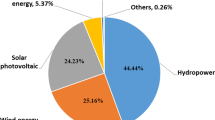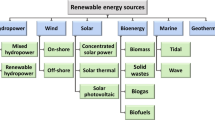Abstract
Existing studies have shown that climate change has important implications for residential electricity consumption, yet how responses to climate vary between rural and urban residents, and more importantly, the roles of electricity pricing regimes in determining such responses remain largely unknown. In this paper, we explore these issues using monthly data in Anhui province in China. Our results suggest that on average rural residents are more sensitive to cooling degree days (CDD) than urban counterparts (0.19% vs 0.08% increase in electricity consumption per unit increase in CDD). Additionally, households who adopt the time of use (TOU) pricing regime tend to be less responsive to temperatures than households choosing tiered pricing regimes (TPHE). Substantial increases in electricity demand induced by climate change are expected in the future. With the pessimistic RCP8.5 scenario, our results suggest an increase of 35.5% and 77.1% in electricity demand respectively for the urban and rural residents in the 2080s relative to 2017.






Similar content being viewed by others
Data availability
Data will be made available on reasonable request.
Notes
There are many factors affecting residents’ electricity demand. Some studies focus on the effects of economic development and demographic characteristics, including income (Auffhammer and Wolfram 2014; Yin et al. 2016), population (Adom 2017; Ota et al. 2018), family size (Wu et al. 2021), and electricity price (Shaffer 2020; Wu et al. 2021; Yin et al. 2016).
There are a few exceptions. For instance, based on city-level data from 2005 to 2015, Du et al. (2020) find that climate change characterized by global warming significantly increases household electricity consumption. Using hourly household-level data in Shanghai, Li et al. (2018a) show that the annual peak electricity consumption increases by 36.1% with a 1 °C increase in mean temperature. Relying on household survey data in China, Zhang et al. (2022) find that one extra day with mean temperature exceeding 32 °C leads to an 8.9% increase in annual electricity consumption.
According to the the World Meteorological Organization (WMO), sunshine duration during a given period is defined as the sum of the time for which the direct solar irradiance exceeds 120 W/m2.
We use stations in Bozhou, Suzhou, and Bengbu for Huaibei and stations in Anqing, Tongling, Xuancheng, and Huangshan for Chizhou.
Nonetheless, the panel data model relies on time series variations (year-to-year weather shocks) and thus reflects the short-run effects. As a result, it does not fully take into account the long-run adaption as in the cross-sectional model (see detailed reviews in Blanc and Schlenker (2017), Kolstad and Moore (2020), and Hsiang (2016)).
Another possible explanation is that the rural residents have large per capita living space than their urban counterpart. According to the Statistical Bulletin on National Economic and Social Development of Anhui Province in 2021, per capita living space in rural area was 54.7 m2, whereas it was 42.3 m2 in urban area. Additionally, differences in isolation conditions may also contribute to different responsiveness to CDD in electricity use.
Thus, we consider our projection a lower bounder of energy demand amid climate change. The realized demand could be much larger if we further factor in population growth and economic development, indicating more threats to energy supply.
References
Adom PK (2017) The long-run price sensitivity dynamics of industrial and residential electricity demand: the impact of deregulating electricity prices. Energy Econ 62:43–60
Alin A (2010) Multicollinearity. Wiley Interdiscip Rev Comput Stat 2:370–374
Auffhammer M (2018) Quantifying economic damages from climate change. J Econ Perspect 32:33–52
Auffhammer M (2022) Climate Adaptive Response Estimation: short and long run impacts of climate change on residential electricity and natural gas consumption. J Environ Econ Manag 114:102669. https://doi.org/10.1016/j.jeem.2022.102669
Auffhammer M, Wolfram CD (2014) Powering up China: income distributions and residential electricity consumption. Am Econ Rev 104:575–580
Auffhammer M, Baylis P, Hausman CH (2017) Climate change is projected to have severe impacts on the frequency and intensity of peak electricity demand across the United States. Proc Natl Acad Sci 114:1886
Berkouwer SB (2020) Electric heating and the effects of temperature on household electricity consumption in South Africa. Energy J 41(4):209–225
Bessec M, Fouquau J (2008) The non-linear link between electricity consumption and temperature in Europe: a threshold panel approach. Energy Econ 30:2705–2721
Blanc E, Schlenker W (2017) The use of panel models in assessments of climate impacts on agriculture. Rev Environ Econ Policy 11:258–279
Bureau of Statistics of Anhui (2018) Anhui Statistical Yearbook. Bureau of Statistics of Anhui
Burke PJ, Liao H (2015) Is the price elasticity of demand for coal in China increasing? China Econ Rev 36:309–322
Burke M, Hsiang SM, Miguel E (2015) Global non-linear effect of temperature on economic production. Nature 527:235–239
Campbell A (2018) Price and income elasticities of electricity demand: evidence from Jamaica. Energy Econ 69:19–32
Chen S, Chen X, Xu J (2016) Impacts of climate change on agriculture: evidence from China. J Environ Econ Manag 76:105–124
CMDC, 2022. China Meteorological Data Service Centre. http://data.cma.cn/en. Accessed in May 2022.
Dell M, Jones BF, Olken BA (2012) Temperature shocks and economic growth: evidence from the last half century. Am Econ J Macroecon 4:66–95
Deschênes O, Greenstone M (2007) The economic impacts of climate change: evidence from agricultural output and random fluctuations in weather. Am Econ Rev 97:354–385
Du G, Lin W, Sun C, Zhang D (2015) Residential electricity consumption after the reform of tiered pricing for household electricity in China. Appl Energy 157:276–283
Du K, Yu Y, Wei C (2020) Climatic impact on China’s residential electricity consumption: does the income level matter? China Econ Rev 63:101520
Fan J-L, Hu J-W, Zhang X (2019) Impacts of climate change on electricity demand in China: an empirical estimation based on panel data. Energy 170:880–888
Franco G, Sanstad AH (2008) Climate change and electricity demand in California. Clim Chang 87:139–151
Guang F, He Y, Wen L (2019) Impacts of hybrid time-varying tariffs on residential electricity demand: the case of Zhejiang province. Util Policy 61:100969
Guo Z, Zhou K, Zhang C, Lu X, Chen W, Yang S (2018) Residential electricity consumption behavior: influencing factors, related theories and intervention strategies. Renew Sust Energ Rev 81:399–412
He L-Y, Liu L, Ouyang Y, Li L (2019) Consumer demand, pollutant emissions and public health under increasing block tariffs and time-of-use pricing policies for household electricity in China. Emerg Mark Financ Trade 1:22
Hsiang S (2016) Climate Econometrics. Ann Rev Resour Econ 8:43–75
IEA (2020) World Energy Balances. International Energy Agency (IEA)
Ito K (2014) Do consumers respond to marginal or average price? Evidence from nonlinear electricity pricing. Am Econ Rev 104:537–563
Kolstad CD, Moore FC (2020) Estimating the economic impacts of climate change using weather observations. Rev Environ Econ Policy 14:1–24
Li Y, Prizer W, Wu L (2018a) Climate change and residential electricity consumption in the Yangtze River Delta, China. Proc Natl Acad Sci 116:472–477
Li L, Yao Y, Yang R, Zhou K (2018b) Is it more effective to bring time-of-use pricing into increasing block tariffs? Evidence from evaluation of residential electricity price policy in Anhui province. J Clean Prod 181:703–716
Mansfield ER, Helms BP (1982) Detecting multicollinearity. Am Stat 36:158–160
MEEC, 2021. National Climate Change Adaptation Strategy 2035 (in Chinese). The Ministry of Ecology and Environment of China
Mendelsohn R, Nordhaus WD, Shaw D (1994) The impact of global warming on agriculture: a Ricardian analysis. Am Econ Rev 84:753–771
National Bureau of Statistics (2021) China Statistical Yearbook. National Bureau of Statistics
Ota T, Kakinaka M, Kotani K (2018) Demographic effects on residential electricity and city gas consumption in the aging society of Japan. Energy Policy 115:503–513
Romitti Y, Sue Wing I (2022) Heterogeneous climate change impacts on electricity demand in world cities circa mid-century. Sci Rep 12:4280. https://doi.org/10.1038/s41598-022-07922-w
Rosenthal DH, Gruenspecht HK, Moran EA (1995) Effects of global warming on energy use for space heating and cooling in the United States. Energy J 15(2):77–96
Schlenker W, Hanemann WM, Fisher AC (2006) The impact of global warming on U.S. agriculture: an econometric analysis of optimal growing conditions. Rev Econ Stat 88:113–125
Schlenker W, Roberts MJ (2009) Nonlinear temperature effects indicate severe damages to U.S. crop yields under climate change. Proc Nat Acad Sci 106:–15594
Shaffer B (2020) Misunderstanding nonlinear prices: evidence from a natural experiment on residential electricity demand. Am Econ J Econ Pol 12:433–461
Sun C, Ouyang X (2016) Price and expenditure elasticities of residential energy demand during urbanization: an empirical analysis based on the household-level survey data in China. Energy Policy 88:56–63
Thornton HE, Hoskins BJ, Scaife AA (2016) The role of temperature in the variability and extremes of electricity and gas demand in Great Britain. Environ Res Lett 11:114015
Wu W, Kanamori Y, Zhang R, Zhou Q, Takahashi K, Masui T (2021) Implications of declining household economies of scale on electricity consumption and sustainability in China. Ecol Econ 184:106981
Yin H, Zhou H, Zhu K (2016) Long- and short-run elasticities of residential electricity consumption in China: a partial adjustment model with panel data. Appl Econ 48:2587–2599
Zhang M, Zhang K, Hu W, Zhu B, Wang P, Wei Y-M (2020) Exploring the climatic impacts on residential electricity consumption in Jiangsu. China Energy Policy 140:111398
Zhang S, Guo Q, Smyth R, Yao Y (2022) Extreme temperatures and residential electricity consumption: evidence from Chinese households. Energy Econ 107:105890. https://doi.org/10.1016/j.eneco.2022.105890
Zheng X, Wei C, Qin P, Guo J, Yu Y, Song F, Chen Z (2014) Characteristics of residential energy consumption in China: findings from a household survey. Energy Policy 75:126–135
Zheng S, Huang G, Zhou X, Zhu X (2020) Climate-change impacts on electricity demands at a metropolitan scale: a case study of Guangzhou. China Appl Energy 261:114295
Funding
The authors gratefully acknowledge the financial support of the National Natural Science Foundation of China under Grant no. 72174196, the Huo Yingdong Education Foundation (Grant no. 171072), the Open Research Project of State Key Laboratory of Coal Resources and Safe Mining (China University of Mining and Technology) (no. SKLCRSM21KFA05), and the Fundamental Research Funds for the Central Universities (no. 2022JCCXNY02).
Author information
Authors and Affiliations
Contributions
Jingli Fan and Yabin Da framed the study. Bin Zeng collected the data from Lanlan Li and performed the analysis with the help of Jiawei Hu. All authors contributed to writing and reviewing the manuscript.
Corresponding author
Ethics declarations
Ethics approval and consent to participate
Not applicable.
Consent for publication
All authors agreed with the content and all gave explicit consent to submit.
Competing interests
The authors declare no competing interests.
Additional information
Publisher’s note
Springer Nature remains neutral with regard to jurisdictional claims in published maps and institutional affiliations.
Supplementary information
ESM 1
(DOCX 32 kb)
Rights and permissions
Springer Nature or its licensor (e.g. a society or other partner) holds exclusive rights to this article under a publishing agreement with the author(s) or other rightsholder(s); author self-archiving of the accepted manuscript version of this article is solely governed by the terms of such publishing agreement and applicable law.
About this article
Cite this article
Da, Y., Zeng, B., Fan, JL. et al. Heterogeneous responses to climate: evidence from residential electricity consumption. Climatic Change 176, 110 (2023). https://doi.org/10.1007/s10584-023-03590-5
Received:
Accepted:
Published:
DOI: https://doi.org/10.1007/s10584-023-03590-5




